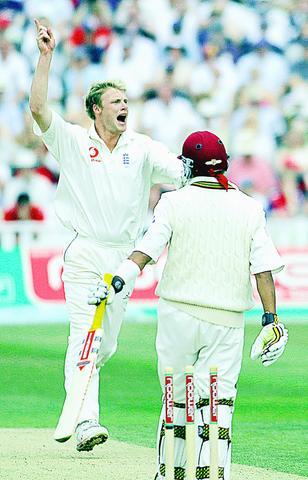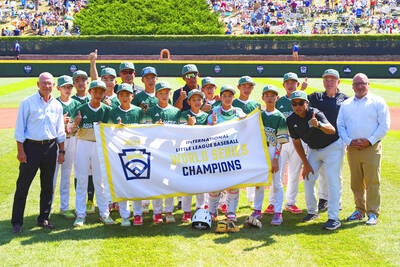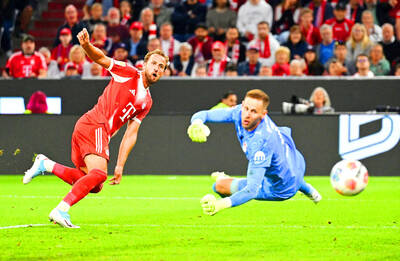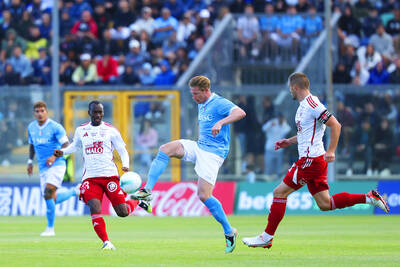The Oval Test match in London began yesterday. Normally, apart from a few Thermos-toting obsessives intent on getting to the Harleyford Road early for the 10.30am start, that would mean little. In the week that the Olympic flame was ignited and the English soccer Premiership league kicked off, it should mean nothing: A sideshow in the global sporting funfair. But, happily, this year is different. England are winning, are playing exuberant cricket, and have found a new superstar: Andrew "Freddie" Flintoff, the man who has achieved what appeared to be impossible and made cricket sexy again.
Since Ian Botham retired more than a decade ago, England have been looking for a new hero. The phrase "the next Ian Botham" has been hung around a succession of players' necks and gripped so tightly that they were strangled. David Capel, Derek Pringle, Ronnie Irani. Remember them? Thought not. But Flintoff, after a stuttering start, is living up to the hype. Now 27, he has matured into a destructive batsman who can play long innings, a fiery fast bowler who can disconcert the opposition (witness the way he bounced out the great Brian Lara on Sunday), and a brilliant slip catcher.

PHOTO: AFP
He is three players in one; the talisman of an increasingly confident team; the hope for the Ashes clash that will dominate next summer.
Rare talent
More than that, Flintoff is a player who transcends his sport, one of those rare talents who can attract new converts. Cricket can sometimes seem a trifle slow: Groucho Marx was once taken to Lord's cricket ground in London to see a match and, after an hour's play, turned to his host and asked when it was going to start. A Test match can last 30 hours -- twice as long as Wagner's Ring cycle. But Flintoff overcomes the prejudice against a long, slow, meandering game that, even after five days (or 10 days in the case of one famous Test in South Africa in 1939), can still end in a draw. He is the sport's great hope for a golden future.
Flintoff has been called a "boy's own hero," and never was the phrase more appropriate. First, there is the utter simplicity of his approach. When he bats, his principal desire is to hit the ball as hard and as far as possible. He has already struck almost 50 sixes in Test matches and there is no doubt that he will end up as the six-hitting record-holder. Babe Freddie! When he arrives at the crease, his adoring fans start baying for him to smash the ball over the ropes. He has even said that sometimes this puts too much pressure on him, forcing him into wanton aggression too early in his innings. But mostly, he does it anyway: It's the way he plays.
There was a very Freddie moment at the Birmingham Test match earlier this month when he launched a six into the upper tier of a stand (while making an extraordinary, match-winning 167). Who should be under the ball but his father, Colin? Dad promptly spilled the catch, for which Flintoff junior gave him a fearful ribbing in his end-of-play TV interview. Which is the other key point about Flintoff: He is funny, unaffected, unchanged by stardom. He is still the big, brawny boy from Preston who likes a pint and a laugh, and most of all loves the game of cricket.
Flintoff is a cricketing Alf Tupper. For those readers who didn't read Victor comic circa 1967, Tupper ("the Tough of the Track") was a lovable but tenacious Brit who used to work as a welder, live on fish and chips, and invariably win gold for his country, beating all manner of dodgy Russians, egotistical Americans and Vorsprung durch Technik Germans. It was not enough to win: The winner had to be simple, straightforward, approachable and level-headed, an ordinary bloke like you or me. Win the 1500m? Anyone could do it -- just eat an extra portion of cod.
Now, of course, it's not cod you have to eat to win gold, but a cocktail of designer drugs dreamed up in California. And Roy of the Rovers is earning US$600,000 a week, shagging his way around the fleshpots of Melchester and playing in a team dominated by footballing mercenaries with unpronounceable names.
Cricket hasn't quite succumbed to the 21st century, thank God. The top players do dye their hair, drive sports cars and wear designer sunglasses while they bowl, but they do not indulge in the worst excesses of the modern sportsman. Their saving grace is that they spend so long on the field that they don't have the time to prop up bars or get into fights at nightclubs.
Cricket is still played by recognizable human beings. Flintoff is an ordinary genius. Wisden, which this year named him as one of its five cricketers of the year, called him "a farmhand delighting in the coconut shy." He brings the characteristics of the village green -- a violent swing of the bat, uncomplicated fast bowling, laughter and a sense of well-being -- to the Test arena. In an age of paranoia and doubt, Flintoff is liberating, a cold beer on a hot day.
Memorable
Flintoff has only come of age as a cricketer in the past 18 months. He made his debut for England in 1998, but struggled with both bat and ball. He was young, callow, unfit, intimidated by the big names in the England team. His most memorable early moment was when a TV camera panned across the dressing room and spotted a page-three photo in his corner. He was a boy in a man's world.
As a youngster, because he was big and immensely powerful, he always played in teams a couple of years above his age group. He still was -- and he knew it. After one decent performance against Zimbabwe, he gave himself a public pat on the back. "All right for a fat lad," he said. The humor, self-deprecation and sense of perspective has always been there, in the bad times as well as the good.
You only have to see Flintoff interviewed -- hands in pockets, smiling, unfazed by the fact that he has just slayed another dragon -- to sense that he is rooted. He is unlikely ever to use the third person, as sportsman who get above themselves are sometimes wont to do.
In those first years as an England player, Flintoff's "normality" was part of the problem: He was too keen on lager and pizzas, not working hard enough at his game. "Fat Freddie" was becoming a joke. His manager, "Chubby" Chandler, and former Lancashire team-mate Neil Fairbrother read the riot act: He was wasting his talent, was in danger of throwing his career away. He got the message, cut down on the lagers, lost a couple of stone, even took up pilates to strengthen his bad back.
This year he has been transformed. His career statistics are still not exceptional: Almost 2,000 runs, averaging 32.3 per game; 85 wickets at a cost of 37.15 runs per wicket. As averages go, they are very average. But this year, he has been phenomenal: A batting average of 55.5 and 30 wickets at 25. Even those figures do not tell the whole story: It is the way he makes his runs, the fire with which he bowls, his playful swagger when he fields. He makes everything seem possible. His team-mates now keep saying they feel they can win from any position, no matter how bleak. They have self-belief.
Flintoff is their alchemist.
On Monday, it was Flintoff who was at the wicket when England took an unassailable 3-0 lead in the Test series. He had batted sensibly for a couple of hours; then, with victory in sight, he wound himself up and sent the ball into the stratosphere for two huge sixes (where was his father?). To show that he was not just a biffer, he finished the match with a delicate late cut and Old Trafford went wild. A ground on the final day of a Test is often a funereal place: But on this occasion 14,000 had come to celebrate England's new messiah and his team progressing to the promised land.
His nickname -- now universally used except by his mother and his wife-to-be Rachael, who for the moment are sticking with Andrew -- was coined by John Stanworth, the coach of the Lancashire second XI.
When the strapping 15-year-old turned up one day, Stanworth shouted: "It's Fred Flintstone." It seemed perfect for a larger-than-life figure who would, before the fitness regime, have loved nothing better than to tuck into a dinosaur-burger with extra cheese.
Team Man
The most endearing facet of Flintoff's character is that he is so obviously a team man. His hundred for England in a hopelessly lost cause against South Africa at Lord's last year meant little to him; he could barely bring himself to acknowledge the applause when he was eventually dismissed.
Five years ago, the obituarists were sharpening their pens. English cricket appeared to be in its death throes as a national game. "The script for English cricket now seems to be more like the Book of Job than anything else," wrote Wisden editor Matthew Engel in the 2000 edition of the famous almanack. "The English crisis is now the greatest crisis in world cricket."
The England team were the worst in the world. County attendances were pathetic (Derbyshire had just over a thousand members, of which 16 were dogs).
Cricket was deemed slow, irrelevant, meandering; a 19th-century game that offered little to the slick new 21st. Neville Cardus's "background music to an English summer" seemed to have no place in the age of rap. It was the game of country vicars and posh blokes with pipes and tweed suits. And then along came Freddie.
It would be foolish to ascribe the rebirth of English cricket to one man. Coach Duncan Fletcher must take much credit; ditto former captain Nasser Hussain, whose Taliban-like sense of discipline made England competitive again.
But it is Flintoff who is the symbol of the game's extraordinary renaissance. When he struck the winning runs to wrap up the series win against the West Indies, it was impossible not to share the collective pleasure. Middle-aged men threw their Thermos flasks in the air; young women, abjuring the joys of small-bore shooting on TV, jigged; the many children at Old Trafford dreamed, "That could be me." Alf Tupper had triumphed. It is always said of the great cricketing entertainers that they empty bars. How, these days, the breweries must fear Freddie Flintoff.

Kylian Mbappe struck from the penalty spot as Real Madrid beat a dogged CA Osasuna 1-0 on Tuesday to make a winning start in Spanish La Liga under new coach Xabi Alonso. The France striker, last season’s European Golden Shoe winner, scored early in the second half, after he was fouled in the area by Osasuna defender Juan Cruz. It was enough to seal the points in Alonso’s first game in charge at the Santiago Bernabeu, with Madrid now unbeaten in their opening fixture of a league campaign since 2008. “You can see that Kylian wants to do even more

TO THE TOP: After securing the international title on Saturday, Team Taiwan were to face Las Vegas to potentially win their 18th Little League World Series championship A team from Taipei’s Dong Yuan Elementary School won the Little League Baseball World Series’ international title on Saturday by defeating Aruba 1-0 in the annual baseball tournament held in South Williamsport, Pennsylvania. The Taiwan team, competing under the name Chinese Taipei, were after press time last night to face a team from Las Vegas, Nevada, which beat a team from Fairfield, Connecticut, in the US championship 8-2. Taiwan are seeking to win their first Little League Baseball World Series title since 1996. “Really haven’t taken a moment to data dump right now on Taiwan,” Nevada manager T.J. Fescher said. “They’re a

‘CATASTROPHE’: Despite losing several key forwards in the summer transfer window, Bayern were up 3-0 in the first half before Harry Kane scored a hat-trick in the second Harry Kane hit a hat-trick, Michael Olise a double and newcomer Luis Diaz also scored as Bayern Munich made a “statement” against RB Leipzig 6-0 at home in the Bundesliga season opener on Friday. Bayern’s big-money arrivals, all brought in from the Premier League across the past three seasons, were dominant as the Bavarians begun their title defense in style. Olise scored twice in the first half, either side of a Diaz strike. Not to be outdone, Kane scored three goals in the second half — with two assists coming from Diaz, to bring Bayern’s total to 6-0. Kane told the Bundesliga

Kevin de Bruyne is to lead SSC Napoli’s Serie A title defense today when he makes his full debut at promoted US Sassuolo, but the champions head into the new season rocked by a long-term injury to star striker Romelu Lukaku. De Bruyne was, alongside aging icon Luka Modric, the big new name to arrive in Italy this summer and fans were hoping his linkup with Belgium teammate Lukaku would push Napoli to success both at home and in their return to the UEFA Champions League. The 34-year-old has suffered from hamstring injuries which caused him to miss significant chunks of the